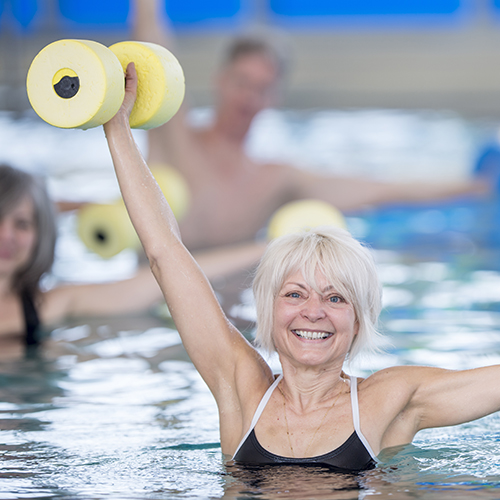22 April 2025
 A brisk walk, a splash of water aerobics, or even a light jog around the block – if your heart rate goes up then so too will your brain health according to new research from the University of South Australia.
A brisk walk, a splash of water aerobics, or even a light jog around the block – if your heart rate goes up then so too will your brain health according to new research from the University of South Australia.
Conducted in partnership with the US-based AdventHealth Research Institute, the new study found that staying active through moderate-to-vigorous physical activity is associated with significantly better processing speed, working memory, and executive function in older adults.
Interestingly, the biggest cognitive gains were seen among people who went from doing no moderate-to-vigorous physical activity, to even doing just five minutes, clearly illustrating the power of exercise for the human brain.
Assessing data from 585 older adults (aged 65-80 years) in the USA-based IGNITE trial*, the study examined associations between time spent in sleep, sedentary behaviour, light physical activity, and moderate-to-vigorous physical activity across the 24-hr day, and cognitive performance.
Researchers identified a two-way relationship between ‘huff-and-puff’ physical activity and brain health: do more exercise and your brain health improves; but do less and it declines.
UniSA researcher, Dr Maddison Mellow says the study highlights how small changes to your daily activities can have big impacts on your brain health.
“There are three mutually exclusive lifestyle behaviours in the 24-hour day – sleep, sedentary behaviour and physical activity – and how these interact to influence our health outcomes,” Dr Mellow says.
“For example, we know that being more active can improve our sleep; or having a better night’s sleep could boost our energy levels to perform physical activity the next day. But what we don’t know is the optimal balance of time spent in each of these behaviours to maximise cognitive performance.
“In this study we explored how different uses of time impact your brain. We found that higher levels of moderate-to-vigorous physical activity – that is, activity performed at higher intensities that increases your heart rate and breathing – was related to better cognitive performance.
“Specifically, ‘huff-and-puff’ physical activity (like aerobic exercise) improves processing speed (how fast your brain thinks), executive function (how well you plan, focus, and multitask) and working memory (your ability to store information for short periods of time).
“Importantly, the opposite was also true: lower levels of this higher intensity physical activity were related to poorer performance on these tests.”
The findings were consistent across different genetic and demographic backgrounds. Interestingly, the findings did not extend to episodic memory (the what, where and when details of an event) or visuospatial function outcomes (your ability to recognise places and navigate through spaces).
Co-researcher, Dr Audrey Collins, says understanding the interplay between different activities could empower older people to make positive health changes.
“There are only 24 hours in a day, so every day, we make decisions about how we spend our time. For example, if we sleep for eight hours, then there’s 16 hours remaining for waking behaviours like physical activity or sedentary behaviour; that’s the basic reality,” Dr Collins says.
“Our results show that how we choose to spend our time across the 24-hour day may be differentially related to our brain health.
“Understanding that we need to prioritise physical activity – such as physical activity that gets our heart rates up, according to our findings – is the key.
“With one in six people in the world expected to be 60 years or older by 2030, we need to make sure we are supporting and empowering people to age well.
“In this instance, we hope that knowledge is power: boost your physical activity and boost your brain health to stay fit and well as you age. However, these results are cross-sectional and need to be tested longitudinally and experimentally.”
Notes for editors:
* The IGNITE study was conducted at the University of Pittsburgh (Pittsburgh, PA), University of Kansas Medical Center (Kansas City, KS), and Northeastern University (Boston, MA) and involved a large, well-characterised sample of cognitively unimpaired older adults. Participants were, on average, 69.8 years of age, predominantly female (70%), and self-reported as inactive.
…………………………………………………………………………………………………………………………
Contacts for interview: Dr Maddison Mellow E: Maddison.Mellow@unisa.edu.au
Dr Audrey Collins E: CFD.ExternalComm@adventhealth.com
Media contact: Annabel Mansfield M: +61 479 182 489 E: Annabel.Mansfield@unisa.edu.au




